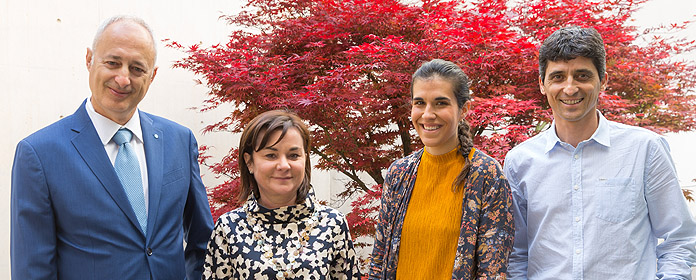19_05_28_EDU_challenges
Four challenges and threats present in adolescence
More than a hundred people attended a workshop at the University of Navarra.

More than a hundred people attended last Tuesday, May 21, to a roundtable organized by the School of Education and Psychology of the University of Navarra, whose goal was to delve into four threats to our young people today.. Specifically, experts María Contreras, Carlos Igual, Olga Martín and Gorka Moreno addressed pornography addiction, cyberbullying, eating disorders (bulimia and anorexia) and drug addiction.
Concepción Naval, dean of the School of Education and Psychology, was in charge of opening this roundtable. Naval launched a reflection to the mothers, fathers and professionals in the audience: "The Education that limits is the one that liberates". Marie-Anne Reynell, director of development of the same School and moderator of the activity, then introduced the members of the table.
Pornography to satisfy curiosity and risk of eating disorders.Maria Contreras, psychologist and expert in pornography addiction, was the first to speak. "Adolescents who consume pornography do so to satisfy a healthy curiosity, they do not know where to turn, so the vast majority do so by accessing the Internet," she explained. The researcher clarified that the moment of greatest consumption among young people "takes place on Sunday night, through their cell phones".
The expert pointed out that the consumption of pornography "changes people" and briefly explained what happens at a cognitive and moral level. Contreras recalled that "mirror neurons imitate behavior". In this way, the psychologist pointed out the difficulty that this subject group of people have in distinguishing fiction from reality; and the consequences that this entails: "loss of interest in reality, objectification of women, acquisition of dominant roles with an aggressive tendency; isolation, comparison of one's own body with what is seen on the screen, erectile dysfunction, loss of intimacy in the couple and of moral judgment, among others".
On the other hand, Contreras explained that when defining whether or not the addition to pornography is a mental problem we have to determine whether or not it affects daily life. "Also when we have tried to find a solution and we do not succeed, when it is consumed to satisfy or change a feeling or emotion," he added.
For her part, Olga Martín, an expert in Eating Disorders, defined the adolescent stage as "a state of transit in which young people are facing many bodily changes, but it is also a psychological, social phenomenon, educational... that we have to take into account".
"We are facing a society where the imposed canons generate a feeling of failure: not everyone is 1.80m tall". This, together with other factors such as the young person being more or less overweight, leave self-esteem, worse social skills..., can be core topic for the young person to develop some kind of disorder subject .
In relation to this idea, Martín explained that the first step in the treatment of these cases is to achieve "nutritional restitution". The expert then claimed that it was essential "not to protocolize the treatments" and emphasized . work multidisciplinary between "pediatricians, nutritionists, psychologists, nurses... to work with the patient and his family".
"Young people suffering from anorexia or bulimia are usually around 12 to 13 years old. However, there are cases in which much younger children have been treated," he alarmed. The family, she explained, can influence this subject of disorders, "there are parents who do not accept that their child is not good at everything". Therefore, communication in the family is core topic for prevention and an early approach to the disease.
The safety of minors on the Internet and drug abuseCarlos Igual, an expert in the safety of minors on the Internet, also briefly addressed the problem of anorexia and other adolescent disorders. In this way, he explained that there are platforms that encourage this subject behavior through challenges that then become viral, rules or commandments created by young people who second and "support" to continue having these behaviors.
He also affirmed that there is a specific language in this subject of contents to refer to different disorders. Thus, to talk about anorexia, they use the word "ama", and they use the word "rex"; or to refer to suicide, they use the word "Dallas" and they use the word "Sue".
Continuing in this line on the contents accessible to young people in the network, the psychologist emphasized that 72.2% of the crimes that exist on the Internet are of sexual subject , and that in most of them, the victim is a minor. He also pointed out several portals where this subject content was dealt with, such as, for example, the darkweb; and he compared the profile pedophile twenty years ago with the current one "Before, they were solitary people. Now, thanks to the Internet, he is connected to other people similar to him; and as a consequence more pedophile content is shared and created".
"If everyone does it, it's okay." We are facing a "social normalization", specified Gorka Moreno. The psychologist stated that two thirds of young people between the ages of 14 and 18 "had gotten drunk". The addictions expert also took the opportunity to talk about the consumption of other substances such as cannabis or hashish, but clarified that the most consumed substance among our young people is alcohol.
Moreno explained that the main protective factor against the consumption of these substances is in the family. "A style that is too authoritarian or too lax can favor drug use", and he specified: "Unconditional affection is not incompatible with limits and rules".
In addition, he stressed the need to facilitate resources in schools to provide an outlet to help young people who find themselves in social difficulties, to prevent them from looking for "quick money" in the world of drugs. "Giving more information about the negative consequences of drug use is not to prevent more, but to give everyone exactly what they need," he concluded.


